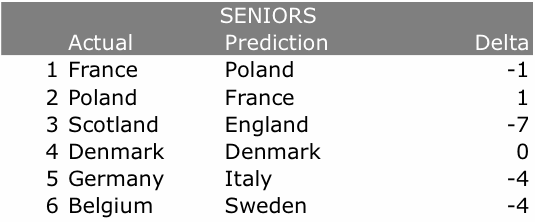 A couple of weeks ago, I posted my predictions on the upcoming European Championships. Now that the event is over, we can look back and see how I did.
A couple of weeks ago, I posted my predictions on the upcoming European Championships. Now that the event is over, we can look back and see how I did.

A quick count shows that I predicted 4 out of 6 teams correctly, but got all the medal spots wrong. Delta in the last column is the difference between predicted and actual result.
Monaco won easily. This is not only the first European bridge title for the Monegask team, to the best of my knowledge, this is also the first time Monaco won an European title in any team sport. That is good for the tiny country. Of course, the team is not from Monaco, it consists of a rich Swiss sponsor and 5 well paid pro’s from abroad who won world titles representing their native countries. In order to make the team eligible, some political arms had to be twisted as well. Also, the sponsor did not play in any of the important matches of the event, in fact he only played 1 match of the final. All in all, it isn’t that far stretched to say that Pierre Zimmermann just became the first sponsor to buy himself an European Championship. This gives bridge the image of a game where the super rich can win important events if they put up enough cash. That is not good.
And for those of you with money to spare: There are at least 10 small European federations where this approach can be repeated. But, rumor has it that Zimmermann is paying each player on his team some 100,000 euro’s for this title, so if you’ve now started to calculate what such a project would cost, you cannot afford it.
Enough said about this. Other results: Italy finished third, which can be considered a loss given that they won 8 of the last 9 events. Sweden, playing with new partnerships, did not make the top 6 as I predicted. The Dutch team did well, winning their first medal in this event since 1995. And we have to go back to 1966 for the last time they won silver. Extra congratulations to Sjoert Brink and Bas Drijver, who won the butler for the event with an amazing 1.12 imp’s per boards board. Second place scored only 0.75 imp’s.

As expected, England and France battled for the title, with England winning this time. Turkey finished a surprisingly high 3rd, with a tiny 0.5 vp margin over the Netherlands. The Polish team finished fifth. Considering that most of the players on this team are still juniors, this team can be expected to be a force in the years to come. I predicted that Germany would not be in the top 6 and was right about that. They were missing their strongest pair, Auken - von Arnim, and their replacements were not capable of making up for that.

As I said before, this is the hardest group to call, as each year other players become eligible. I got the top 2 right, but in the wrong order.
I predicted that The Netherlands would not finish in the top 6 and I was right about that. As I explained in the previous blog on this topic, this is not a surprise. Senior bridge is not a priority for the Dutch bridge federation, so the team sent consisted of 6 players who were prepared to spend a significant amount of money in order to travel and stay in Dublin. Those are not necessarily the 6 best senior players in the country or even 3 established partnerships. Of course, the funds of the Dutch federation are not unlimited either and they can only spend their money once. However, if you try to market bridge as a sport for age 60 and above, it is a bit strange to cut money on the senior team.
 Belgium: I predicted that none of the Belgium teams would make it to the top 6. In the open and women series, I was right about that. The Belgium open team did not make the second stage of the event, the women scored below average. The seniors spoiled my prediction by finishing 4th.
Belgium: I predicted that none of the Belgium teams would make it to the top 6. In the open and women series, I was right about that. The Belgium open team did not make the second stage of the event, the women scored below average. The seniors spoiled my prediction by finishing 4th.
Bottom line: I predicted 11 of the 18 top-6 spots correctly. Not a bad score, but no cigar either.
